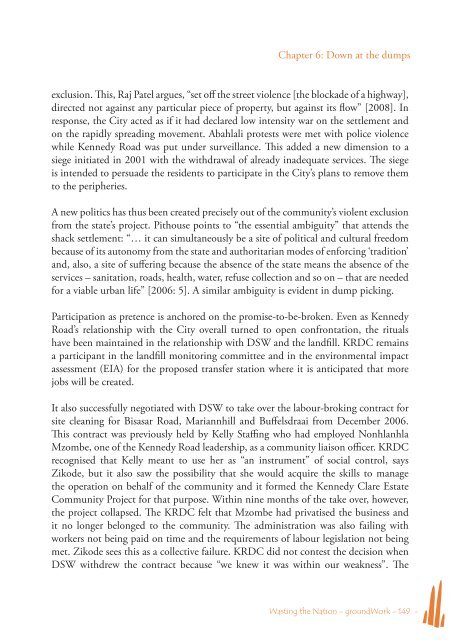Wasting the Nation.indd - Groundwork
Wasting the Nation.indd - Groundwork
Wasting the Nation.indd - Groundwork
Create successful ePaper yourself
Turn your PDF publications into a flip-book with our unique Google optimized e-Paper software.
Chapter 6: Down at <strong>the</strong> dumpsexclusion. This, Raj Patel argues, “set off <strong>the</strong> street violence [<strong>the</strong> blockade of a highway],directed not against any particular piece of property, but against its flow” [2008]. Inresponse, <strong>the</strong> City acted as if it had declared low intensity war on <strong>the</strong> settlement andon <strong>the</strong> rapidly spreading movement. Abahlali protests were met with police violencewhile Kennedy Road was put under surveillance. This added a new dimension to asiege initiated in 2001 with <strong>the</strong> withdrawal of already inadequate services. The siegeis intended to persuade <strong>the</strong> residents to participate in <strong>the</strong> City’s plans to remove <strong>the</strong>mto <strong>the</strong> peripheries.A new politics has thus been created precisely out of <strong>the</strong> community’s violent exclusionfrom <strong>the</strong> state’s project. Pithouse points to “<strong>the</strong> essential ambiguity” that attends <strong>the</strong>shack settlement: “… it can simultaneously be a site of political and cultural freedombecause of its autonomy from <strong>the</strong> state and authoritarian modes of enforcing ‘tradition’and, also, a site of suffering because <strong>the</strong> absence of <strong>the</strong> state means <strong>the</strong> absence of <strong>the</strong>services – sanitation, roads, health, water, refuse collection and so on – that are neededfor a viable urban life” [2006: 5]. A similar ambiguity is evident in dump picking.Participation as pretence is anchored on <strong>the</strong> promise-to-be-broken. Even as KennedyRoad’s relationship with <strong>the</strong> City overall turned to open confrontation, <strong>the</strong> ritualshave been maintained in <strong>the</strong> relationship with DSW and <strong>the</strong> landfill. KRDC remainsa participant in <strong>the</strong> landfill monitoring committee and in <strong>the</strong> environmental impactassessment (EIA) for <strong>the</strong> proposed transfer station where it is anticipated that morejobs will be created.It also successfully negotiated with DSW to take over <strong>the</strong> labour-broking contract forsite cleaning for Bisasar Road, Mariannhill and Buffelsdraai from December 2006.This contract was previously held by Kelly Staffing who had employed NonhlanhlaMzombe, one of <strong>the</strong> Kennedy Road leadership, as a community liaison officer. KRDCrecognised that Kelly meant to use her as “an instrument” of social control, saysZikode, but it also saw <strong>the</strong> possibility that she would acquire <strong>the</strong> skills to manage<strong>the</strong> operation on behalf of <strong>the</strong> community and it formed <strong>the</strong> Kennedy Clare EstateCommunity Project for that purpose. Within nine months of <strong>the</strong> take over, however,<strong>the</strong> project collapsed. The KRDC felt that Mzombe had privatised <strong>the</strong> business andit no longer belonged to <strong>the</strong> community. The administration was also failing withworkers not being paid on time and <strong>the</strong> requirements of labour legislation not beingmet. Zikode sees this as a collective failure. KRDC did not contest <strong>the</strong> decision whenDSW withdrew <strong>the</strong> contract because “we knew it was within our weakness”. The<strong>Wasting</strong> <strong>the</strong> <strong>Nation</strong> - groundWork - 149 -
















